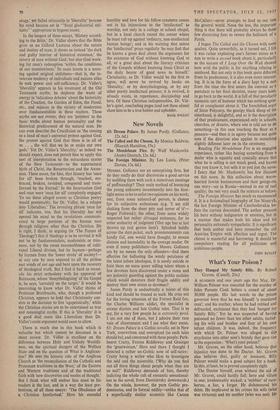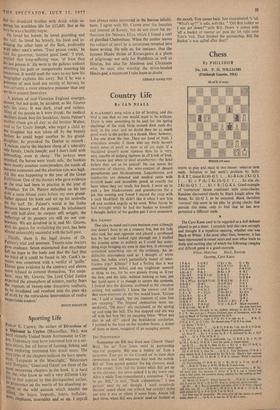What's Your Poison ?
They Hanged My Saintly Billy. By Robert Graves. (Cassell, 21s.) A HUNDRED and one years ago this May, Dr. William Palmer was executed for the murder of John Parsons Cook before a crowd of about 50,000 people. His last words to the prison governor Were that he was himself 'a murdered man'; and his mother, whom he had robbed and defrauded, exclaimed that they had 'hanged mY Saintly Billy.' Yet he was suspected of having poisoned no fewer than ten other adults, includ- ing his wife and brother and four of his own infant children. It was, indeed, the frequency with which Dr. Palmer was alleged to slip strychnine into other men's brandy that gave rise to the expression : 'What's your poison?'
Mr. Graves, on the other hand, believes that injustice was done to the Doctor. Mr. Graves also believes that, guilty or innocent, Billy Palmer would make a good subject for a book. In this, at least, he is proved completely right. The Doctor himself, even without the aid of Mr. Graves, could hardly fail; hero and villain in one; irredeemably wicked; a `nobbler' of race- horses, a liar, a forger. He dishonoured his debts. He implicated in his crimes his wife (who was virtuous) and his mother (who was not). He
fed his drunkard brother with drink while in- suring his worthless life for £13,000. But in his way he was a healthy rogue.
He loved his horses, he loved gambling and the turf; he loved his brandy, his food and in- dulging the other lusts of the flesh, preferably With other men's wives. 'Your prison cooks,' he
told the governor, 'murder good food.' trust,' replied that long-suffering man, 'at least they do not poison it.' He went to the gallows without admitting his guilt or categorically asserting his innocence. It would spoil the story to say how his biographer explains this away. But if he was a Poisoner of men (and not merely of horses), he was certainly a more attractive poisoner than any We have around these days. A picture of mid-Victorian England emerges, almost, but not quite, by accident, as Mr. Graves tells his story. It was dark, cruel and vicious. Most of the people in it were drunk; the medical students drank beer for breakfast; Annie Palmer's mother drank gin all day; so did brother Waiter; and as for Uncle Joseph, who begot a child by his daughter but was taken off by the brandy before he could beget another by his grand- daughter, he provoked the Doctor to remark : I. reckon you're the blackest sheep of a tolerably !Ile family, Uncle Joseph; and I don't hold with inbreeding, even in sheep.' The jockeys were crooked, the horses were 'made safe,' the bookies were mostly amateur moneylenders, the maids all became mistresses and the abortion rate was high. All this was happening in the year of the Great Exhibition. One of the doctors who gave evidence at the trial had been in practice in the year of Waterloo. Yet Dr. Palmer defaulted on his last debt a mere fifteen years before my own grand- father opened his book and set up his umbrella on the turf. Dr. Palmer's world is the limbo between history and the present. Its inhabitants are still half-alive, its corpses still wriggle, the sufferings of its paupers are still on our con- sciences. We are involved in it, and Mr. Graves, With his genius for revitalising the past, has been almost unbearably successful with the half-past.
Finally, there is the legal drama of Dr. Palmer's trial and sentence. Twenty-nine doctors gave evidence. Seven maintained that strychnine left no trace in the body and that the fact that no trace of it could he found in Mr. Cook's re- mains was consistent with a verdict of 'guilty.' Eleven gave evidence to the contrary and eleven more refused to commit themselves. 'Yet some- how,' says Mr. Graves, 'the Lord Chief Justice "Peered the atmosphere of science, murky from the vapours of twenty-nine discursive intellects, to be irradiated and resolved into the pure sky of truth by the miraculous intervention of twelve respectable traders.'
JENNY NASMYTH















































 Previous page
Previous page